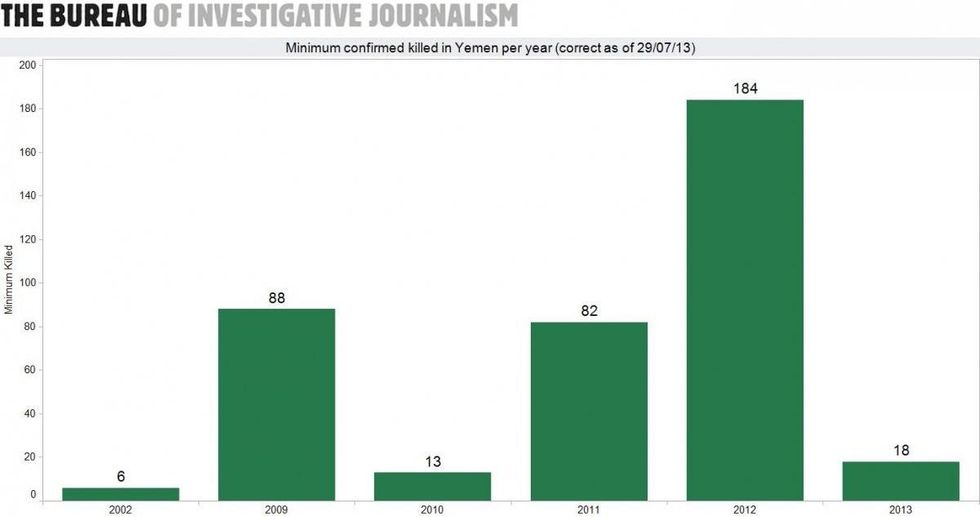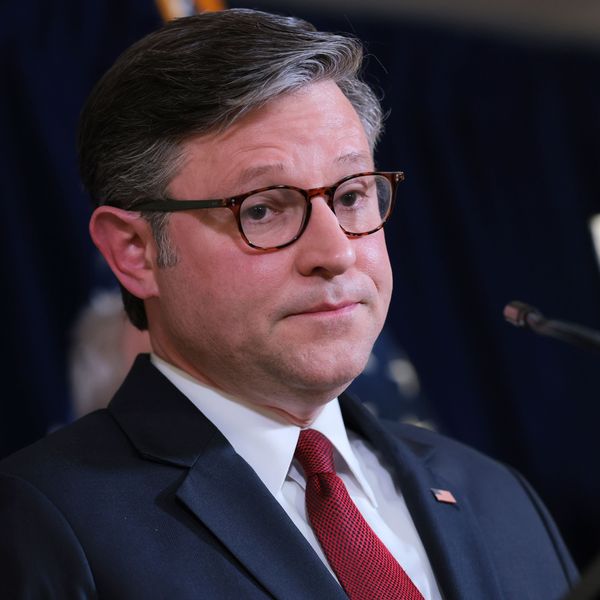US Welcomes Yemen's President With Drone Strike on Yemen
Third drone strike in five days marks day when President Obama meets with Yemen's President Hadi
The U.S. has ushered in the hours ahead of a meeting between President Obama and Yemen's President Abd Rabbu Mansour Hadi with a drone attack on the poverty-stricken Arab state, marking the third such strike in five days.
The drone attack on Thursday hit the southeastern province of Hadramawt, killing four people described in corporate media reports as suspected Al-Qaida members, though Twitter users in Yemen have countered the Al-Qaida claim and indicate one of those killed was a child.
Among the expected topics of discussion for Obama and Hadi's meeting are how to "further strengthen our counter-terrorism partnership and enable the return of Yemeni detainees at Guantanamo Bay who have been designated for transfer."
Faisal bin Ali Jaber, a Yemeni civilian whose nephew and brother-in-law were killed in a U.S. drone strike last year, made a plea to Obama and Hadi ahead of their meeting, warning the leaders that the U.S. drone strikes are fomenting vengeance against the U.S. and Yemeni governments.
"To this day I wish no vengeance against the United States or Yemeni governments. But not everyone in Yemen feels the same. Every dead innocent swells the ranks of those you are fighting," Jaber wrote in his letter to Obama.
Jaber's comments echo those of young Yemeni writer and activist Ibrahim Mothana, who penned an op-ed in the New York Times last year describing how the U.S. drone strikes on Yemen are causing "furious retaliation":
Drone strikes are causing more and more Yemenis to hate America and join radical militants; they are not driven by ideology but rather by a sense of revenge and despair. . . .
America's counterterrorism policy here is not only making Yemen less safe by strengthening support for A.Q.A.P. [al-Qaida in the Arabian Peninsula] but it could also ultimately endanger the United States and the entire world.
Despite such pleas, drone strikes on Yemen spiked in 2012.
The graphic below from the London-based Bureau of Investigative Journalism shows the minimum number of people it can confirm have been killed by strikes in Yemen:

_____________________________
An Urgent Message From Our Co-Founder
Dear Common Dreams reader, The U.S. is on a fast track to authoritarianism like nothing I've ever seen. Meanwhile, corporate news outlets are utterly capitulating to Trump, twisting their coverage to avoid drawing his ire while lining up to stuff cash in his pockets. That's why I believe that Common Dreams is doing the best and most consequential reporting that we've ever done. Our small but mighty team is a progressive reporting powerhouse, covering the news every day that the corporate media never will. Our mission has always been simple: To inform. To inspire. And to ignite change for the common good. Now here's the key piece that I want all our readers to understand: None of this would be possible without your financial support. That's not just some fundraising cliche. It's the absolute and literal truth. We don't accept corporate advertising and never will. We don't have a paywall because we don't think people should be blocked from critical news based on their ability to pay. Everything we do is funded by the donations of readers like you. Will you donate now to help power the nonprofit, independent reporting of Common Dreams? Thank you for being a vital member of our community. Together, we can keep independent journalism alive when it’s needed most. - Craig Brown, Co-founder |
The U.S. has ushered in the hours ahead of a meeting between President Obama and Yemen's President Abd Rabbu Mansour Hadi with a drone attack on the poverty-stricken Arab state, marking the third such strike in five days.
The drone attack on Thursday hit the southeastern province of Hadramawt, killing four people described in corporate media reports as suspected Al-Qaida members, though Twitter users in Yemen have countered the Al-Qaida claim and indicate one of those killed was a child.
Among the expected topics of discussion for Obama and Hadi's meeting are how to "further strengthen our counter-terrorism partnership and enable the return of Yemeni detainees at Guantanamo Bay who have been designated for transfer."
Faisal bin Ali Jaber, a Yemeni civilian whose nephew and brother-in-law were killed in a U.S. drone strike last year, made a plea to Obama and Hadi ahead of their meeting, warning the leaders that the U.S. drone strikes are fomenting vengeance against the U.S. and Yemeni governments.
"To this day I wish no vengeance against the United States or Yemeni governments. But not everyone in Yemen feels the same. Every dead innocent swells the ranks of those you are fighting," Jaber wrote in his letter to Obama.
Jaber's comments echo those of young Yemeni writer and activist Ibrahim Mothana, who penned an op-ed in the New York Times last year describing how the U.S. drone strikes on Yemen are causing "furious retaliation":
Drone strikes are causing more and more Yemenis to hate America and join radical militants; they are not driven by ideology but rather by a sense of revenge and despair. . . .
America's counterterrorism policy here is not only making Yemen less safe by strengthening support for A.Q.A.P. [al-Qaida in the Arabian Peninsula] but it could also ultimately endanger the United States and the entire world.
Despite such pleas, drone strikes on Yemen spiked in 2012.
The graphic below from the London-based Bureau of Investigative Journalism shows the minimum number of people it can confirm have been killed by strikes in Yemen:

_____________________________
The U.S. has ushered in the hours ahead of a meeting between President Obama and Yemen's President Abd Rabbu Mansour Hadi with a drone attack on the poverty-stricken Arab state, marking the third such strike in five days.
The drone attack on Thursday hit the southeastern province of Hadramawt, killing four people described in corporate media reports as suspected Al-Qaida members, though Twitter users in Yemen have countered the Al-Qaida claim and indicate one of those killed was a child.
Among the expected topics of discussion for Obama and Hadi's meeting are how to "further strengthen our counter-terrorism partnership and enable the return of Yemeni detainees at Guantanamo Bay who have been designated for transfer."
Faisal bin Ali Jaber, a Yemeni civilian whose nephew and brother-in-law were killed in a U.S. drone strike last year, made a plea to Obama and Hadi ahead of their meeting, warning the leaders that the U.S. drone strikes are fomenting vengeance against the U.S. and Yemeni governments.
"To this day I wish no vengeance against the United States or Yemeni governments. But not everyone in Yemen feels the same. Every dead innocent swells the ranks of those you are fighting," Jaber wrote in his letter to Obama.
Jaber's comments echo those of young Yemeni writer and activist Ibrahim Mothana, who penned an op-ed in the New York Times last year describing how the U.S. drone strikes on Yemen are causing "furious retaliation":
Drone strikes are causing more and more Yemenis to hate America and join radical militants; they are not driven by ideology but rather by a sense of revenge and despair. . . .
America's counterterrorism policy here is not only making Yemen less safe by strengthening support for A.Q.A.P. [al-Qaida in the Arabian Peninsula] but it could also ultimately endanger the United States and the entire world.
Despite such pleas, drone strikes on Yemen spiked in 2012.
The graphic below from the London-based Bureau of Investigative Journalism shows the minimum number of people it can confirm have been killed by strikes in Yemen:

_____________________________

